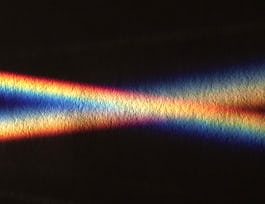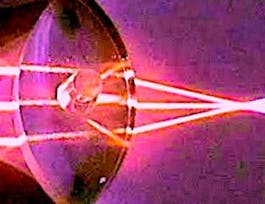This course can also be taken for academic credit as ECEA 5601, part of CU Boulder’s Master of Science in Electrical Engineering degree.


Optical Efficiency and Resolution
This course is part of Optical Engineering Specialization
Taught in English
Some content may not be translated

Instructor: Robert McLeod
6,759 already enrolled
Included with 
Course
(58 reviews)
What you'll learn
Design an optical system with simple mathematical and graphical techniques
Design an optical system with the required field of view and resolution
Analyze the characteristics of your optical system using an industry-standard design tool, OpticStudio by Zemax
Details to know

Add to your LinkedIn profile
12 quizzes
Course
(58 reviews)
See how employees at top companies are mastering in-demand skills

Build your subject-matter expertise
- Learn new concepts from industry experts
- Gain a foundational understanding of a subject or tool
- Develop job-relevant skills with hands-on projects
- Earn a shareable career certificate


Earn a career certificate
Add this credential to your LinkedIn profile, resume, or CV
Share it on social media and in your performance review

There are 5 modules in this course
First order optical system design using rays is useful for the initial design of an optical imaging system, but does not predict the energy and resolution of the system. This module introduces Gaussian beams, a specific example of how the shape of the light evolves in an imaging system.
What's included
12 videos3 readings4 quizzes6 discussion prompts
This module provides the background for the full electro-magnetic field description of optical systems, including a description of plane and spherical waves and a formal treatment of reflection and refraction from this perspective. We start out with a quick review of the mathematical background for this description. This will be fairly short, but you may want to spend some more time reviewing these concepts on your own if you have not seen them for a while.
What's included
8 videos2 readings3 quizzes1 discussion prompt
This module provides an introduction to the basics of Fourier Optics, which are used to determine the resolution of an imaging system. We will discuss a few Fourier Transforms that show up in standard optical systems in the first subsection and use these to determine the system resolution, and then discuss the differences between coherent and incoherent systems and impulse responses and transfer functions in the second subsection. We will wrap up with a discussion of these concepts using OpticStudio.
What's included
10 videos2 quizzes1 discussion prompt
This module takes the concepts of pupils and resolution that we have discussed in the previous modules and works through how to apply them to our first-order optical design systems. We start with a description of how to find the system pupils and windows, then move on to a discussion of how that affects the imaging properties of this system, and finally return to the Lagrange invariant and its utility in optical system design.
What's included
11 videos2 quizzes2 discussion prompts
One of the main questions you ask when designing an optical system is "How much light can I get through the system?" In this last section of new content for this course, we move from talking about resolution to talking about the amount of light we expect at each point in the optical system, a field of study called radiometry.
What's included
10 videos1 reading1 quiz
Instructor

Offered by
Recommended if you're interested in Electrical Engineering

University of Colorado Boulder

Coursera Project Network

University of Colorado Boulder

University of Colorado Boulder
Get a head start on your degree
This course is part of the following degree programs offered by University of Colorado Boulder. If you are admitted and enroll, your coursework can count toward your degree learning and your progress can transfer with you.
Why people choose Coursera for their career




Learner reviews
Showing 3 of 58
58 reviews
- 5 stars
51.72%
- 4 stars
25.86%
- 3 stars
13.79%
- 2 stars
1.72%
- 1 star
6.89%

Open new doors with Coursera Plus
Unlimited access to 7,000+ world-class courses, hands-on projects, and job-ready certificate programs - all included in your subscription
Advance your career with an online degree
Earn a degree from world-class universities - 100% online
Join over 3,400 global companies that choose Coursera for Business
Upskill your employees to excel in the digital economy
Frequently asked questions
Access to lectures and assignments depends on your type of enrollment. If you take a course in audit mode, you will be able to see most course materials for free. To access graded assignments and to earn a Certificate, you will need to purchase the Certificate experience, during or after your audit. If you don't see the audit option:
The course may not offer an audit option. You can try a Free Trial instead, or apply for Financial Aid.
The course may offer 'Full Course, No Certificate' instead. This option lets you see all course materials, submit required assessments, and get a final grade. This also means that you will not be able to purchase a Certificate experience.
When you enroll in the course, you get access to all of the courses in the Specialization, and you earn a certificate when you complete the work. Your electronic Certificate will be added to your Accomplishments page - from there, you can print your Certificate or add it to your LinkedIn profile. If you only want to read and view the course content, you can audit the course for free.
If you subscribed, you get a 7-day free trial during which you can cancel at no penalty. After that, we don’t give refunds, but you can cancel your subscription at any time. See our full refund policy.

